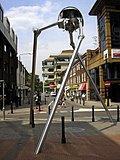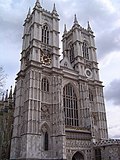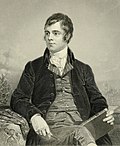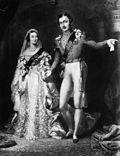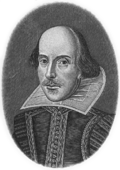Portal:United Kingdom
The United Kingdom Portal
 |
 |
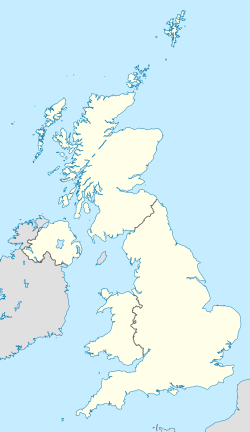
| |
The United Kingdom of Great Britain and Northern Ireland, commonly known as the United Kingdom (UK) or Britain, is a country in Northwestern Europe, off the coast of the continental mainland. It comprises England, Scotland, Wales, and Northern Ireland. The UK includes the island of Great Britain, the north-eastern part of the island of Ireland, and most of the smaller islands within the British Isles, covering 94,354 square miles (244,376 km2). Northern Ireland shares a land border with the Republic of Ireland; otherwise, the United Kingdom is surrounded by the Atlantic Ocean, the North Sea, the English Channel, the Celtic Sea, and the Irish Sea. The UK maintains sovereignty over the British Overseas Territories, which are located across various oceans and seas globally. The United Kingdom had an estimated population of over 68.2 million people in 2023. The capital and largest city of both England and the United Kingdom is London. The cities of Edinburgh, Cardiff, and Belfast are the national capitals of Scotland, Wales, and Northern Ireland, respectively.
The UK has been inhabited continuously since the Neolithic. In AD 43, the Roman conquest of Britain began; the Roman departure was followed by Anglo-Saxon settlement. In 1066, the Normans conquered England. With the end of the Wars of the Roses, the English state stabilised and began to grow in power, resulting by the 16th century in the annexation of Wales, and the establishment of the British Empire. Over the course of the 17th century, the role of the British monarchy was reduced, particularly as a result of the English Civil War. In 1707, the Kingdom of England and the Kingdom of Scotland united under the Treaty of Union to create the Kingdom of Great Britain. In the Georgian era, the office of prime minister became established. The Acts of Union 1800 incorporated the Kingdom of Ireland to create the United Kingdom of Great Britain and Ireland in 1801. Most of Ireland seceded from the UK in 1922 as the Irish Free State, and the Royal and Parliamentary Titles Act 1927 created the present United Kingdom.
The UK became the first industrialised country and was the world's foremost power for the majority of the 19th and early 20th centuries, particularly during the Pax Britannica between 1815 and 1914. The British Empire was the leading economic power for most of the 19th century, a position supported by its agricultural prosperity, its role as a dominant trading nation, a massive industrial capacity, significant technological achievements, and the rise of 19th-century London as the world's principal financial centre. At its height in the 1920s, the British Empire encompassed almost a quarter of the world's landmass and population, and was the largest empire in history. However, its involvement in the First World War and the Second World War damaged Britain's economic power, and a global wave of decolonisation led to the independence of most British colonies. (Full article...)
Featured article
Bodyline was a cricketing tactic devised by the English cricket team for their 1932–33 tour of Australia, specifically to combat the extraordinary batting skill of Australia's Don Bradman. It involved bowlers deliberately aiming the cricket ball at the bodies of batsmen. This caused several injuries to Australian players and led to ill-feeling between the countries that rose to diplomatic levels. Following the 1932–33 series, several authors, including many of the players involved in it, released books expressing various points of view about Bodyline. Many argued that it was a scourge on cricket and must be stamped out, while some claimed not to understand what all the fuss was about. (Full article...)
Featured biography
Charles Darwin was an English naturalist who proposed and provided evidence for the theory that all species have evolved over time from a common ancestor through the process of natural selection. This theory came to be accepted by the scientific community in modified form, forming much of the basis of modern evolutionary theory, a cornerstone of biology. His five-year voyage on the Beagle established him as a prominent geologist whose observations and theories supported uniformitarianism. Puzzled by the geographical distribution of wildlife and fossils he collected on the voyage, Darwin investigated the transmutation of species and conceived his theory of natural selection in 1838. In 1858, Alfred Russel Wallace sent him an essay describing a similar theory, causing the two to publish their theories in a joint publication. His 1859 book On the Origin of Species established evolution by common descent as the dominant scientific explanation of the diversity of life in nature. (Full article...)
General images -
Subportals
WikiProjects
Things you can do
- Visit the British Wikipedians' notice board.
- The noticeboard is the central forum for information and discussion on editing related to the United Kingdom.
- Comment at the British deletion sorting page.
- This page lists deletion discussions on topics relating to the United Kingdom.
Featured pictures
Did you know -

- ... that "one of the finest cut brick façades" in the United Kingdom has been partially obscured by scaffolding for four years, as funds are raised for its repair?
- ... that Oxford is the first city in the United Kingdom to adopt a zero emission zone?
- ... that neighboring British Sierra Leone and Liberia disputed their border, and the British Empire seized the disputed territory in 1885?
- ... that by losing her constituency of South West Norfolk in 2024, Liz Truss became the first former UK prime minister since 1935 to lose their seat?
- ... that the 2023 United Kingdom student protests were organised on TikTok and Snapchat?
- ... that Phil Fletcher as Hacker T. Dog caused Lauren Layfield to make the "most famous snort" in the United Kingdom in 2016?
In the news
- 1 May 2025 –
- The world's oldest person, Brazilian nun Inah Canabarro Lucas, dies at the age of 116 years and 326 days. The new oldest living person is British supercentenarian Ethel Caterham, who is the last person born in the 1900s decade, the last living subject of King Edward VII, and the oldest British person ever. (BBC News) (The Telegraph)
- 1 May 2025 – 2025 United Kingdom local elections
- The United Kingdom holds local elections, as well as a parliamentary by-election in the Runcorn and Helsby constituency. (BBC News)
- 16 April 2025 –
- The United Kingdom suspends the import of cheese and meat products from the European Union to prevent the spread of foot-and-mouth disease. (BBC News)
- 16 April 2025 – Transgender rights in the United Kingdom, For Women Scotland Ltd v The Scottish Ministers
- The Supreme Court of the United Kingdom rules that legal gender is based upon biological sex for the purposes of the Equality Act 2010. (BBC News)
- 15 April 2025 – Sudanese civil war, Foreign aid to Sudan
- The European Union and its member states pledge €522 million (US$590 million) and the United Kingdom pledges £120 million (US$141 million) in humanitarian aid to Sudan to deliver food and supplies to over 650,000 internally displaced Sudanese people affected by the fighting between the Rapid Support Forces and the Sudanese Armed Forces. The two groups also call for an immediate ceasefire to end the war. (DW) (AP)
- 14 April 2025 – Russian invasion of Ukraine
- United Kingdom and the Russian invasion of Ukraine
Categories
Other UK-connected Wikipedias
Wikimedia
The following Wikimedia Foundation sister projects provide more on this subject:
-
Commons
Free media repository -
Wikibooks
Free textbooks and manuals -
Wikidata
Free knowledge base -
Wikinews
Free-content news -
Wikiquote
Collection of quotations -
Wikisource
Free-content library -
Wikiversity
Free learning tools -
Wikivoyage
Free travel guide -
Wiktionary
Dictionary and thesaurus


































